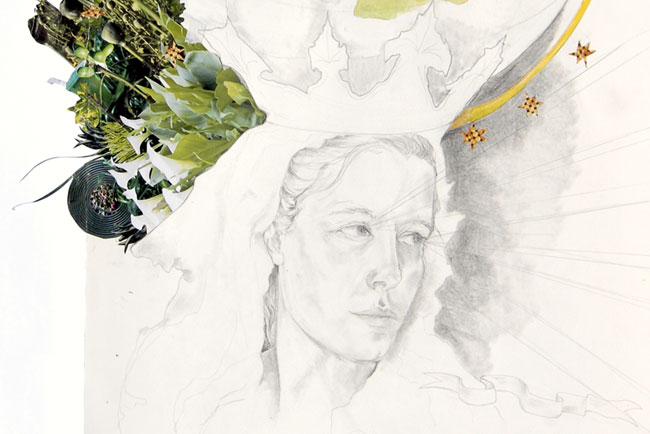Bernard-Henri Lévy, author of American Vertigo and superstar philosopher in his native country, has curated an exhibit for the Fondation Maeght in southern France. “Adventures of the Truth: A Narrative” explores the relationship of art to philosophy over the last six centuries.
Issue 13 - Luck

Green Witch by Brett Windham
The theme for this issue came about simply enough: it's HRM's lucky number 13! [Cue applause.] But I've been having a particularly hard time coming to the letter from the editor this time around. I think it's because I don't know how much faith I have in luck, or to what extent I really believe in it.
I recently completed a survey for researchers at Princess Margaret Hospital who were trying to evaluate actually, I'm not exactly sure what they were trying to evaluate. It was something to do with how cancer survivors perceive their current lives and how much of this was affected by having had cancer. It's interesting doing a survey of which you don't know the purpose, and thus trying to figure out the significance and overarching themes of the questions. From what I could tell, many of them were about luck and control. Whether I saw myself as a victim or controller, as cause or effect.
(I suppose you could say that I was lucky to have survived, and I believe that. In this situation I prefer it to terms like "bravery" or "fate", because what of the flip side?)
Luck comes from the German word for happiness, and in French, it's translated as chance. Where, along the twisted and deep-rooted etymological tree, did this division in definitions come from? I don't think happiness and chance are mutually exclusive, but they definitely aren't the same thing. You can be happy and unlucky, lucky and unhappy. (Or lucky and happy, or unlucky and unhappy.) A Catholic, an agnostic, and a lapsed Protestant were sitting around a table discussing this, and we could all agree that "luck" meant that the powers of the universe are on your side, however you might define the specific powers. If there is some sort of event - a bet, a contest, a race, an illness - in which the odds are either equal or against you, luck is when you beat the odds, win the gamble, and survive. Winning might make you happy or sad, for all sorts of various reasons, but happiness does not equal luck. Believing in luck can take away both responsibility and ego. Perhaps we could overlap the definitions and say that luck is when you get those chance bursts of inexplicable, fleeting happiness?
But is luck something we make for ourselves? Or do you believe in fate?
In this issue are stories about things like meteorites falling in backyards; a fable about a man who gets crushed by the rock he's been carrying all his life; a poem about Joan of Arc and a mono-syllabic prose poem about getting stuck in the métro; a personal essay about relationships to lucky charms; and, of course, a range of beautiful visual artwork. Explore this issue and think about these questions, about luck and fate and chance, whether or not you've made up your mind about your own answers.
Harriet Alida Lye
Editor in Chief






